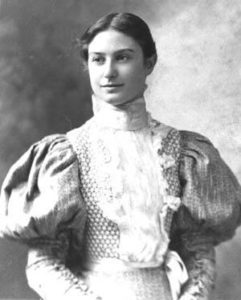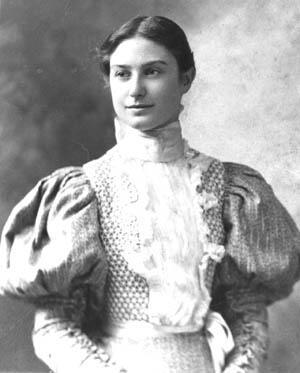By: Stephanie Kaloi

Source: Jewish Women’s Archive.
When we talk about social activism and progressive politics, the southern United States isn’t often at the forefront of most people’s minds – much to the chagrin of those who were born and/or live here. North Carolina in particular has a murky history when it comes to social justice and fighting for workers’ rights.
Gertrude Weil was born on December 11, 1879 in Goldsboro, North Carolina, only 14 years after the state officially abolished slavery. Her parents were Henry and Mina Weil, German Jews who also lived in Goldsboro. Her family’s path to the United States was direct: Henry’s father, also named Henry, immigrated to the States from Hamburg, Germany in 1860.
Being Jewish in the United States didn’t automatically put the Weil family on the progressive side of history, and despite the racially and ethnically charged plight of Jews in Europe in the mid-to-late 1800s (a period during which European Jews faced bigotry and oppression socially and economically), the elder Henry Weil’s brother, Herman, ended up fighting as part of the Confederate Army during the Civil War. Following the war, the Weil family was one of the wealthier families in Goldsboro and were also among those who established the first synagogue in the city and the second in North Carolina, Congregation Oheb Sholom.
Weil had the benefit of being part of a family that could afford to educate her and to educate her well. A product of the public school system as well as of Sabbath, German, and Hebrew School, Weil attended college in Massachusetts at Smith College. It was there that Weil was introduced to Mary Louise Cable, the sister of George Washington Cable, an outspoken critic of racism and enslavement. Weil also began exploring ideas pertaining to opportunities women had at the time in the world of social justice. By the time her mother established the feminist Goldsboro Women’s Club back home, Weil was primed to join as a loud and proud member.
The club was dedicated to Charlotte Perkins Gilman, who most famously penned “Women and Economics” in 1898, which insisted that women will never know true freedom until they are completely financially independent of anyone else, be it a father, partner, or friend. Despite her work for women, Gilman herself was an open racist who also published an article in the American Journal of Sociology that insisted Black Americans were inferior to everyone else. Gilman went to great lengths to argue that she didn’t mean all Black Americans, clearly unaware of the racist foundation that had to exist to support such an argument in the first place, and suggested that some Black Americans be forced to work as part of a military-esque labor force.
It’s unclear what Weil felt about this aspect of Gilman’s work, though what is clear is that she was inspired by her mother’s passion for Gilman and the work that the Goldsboro Women’s Club focused on. Weil moved back home after graduating from Smith and soon joined both her mother’s club and the North Carolina Federation of Women’s Clubs, where she gained her first true experience in social activism. Within years she had started the Goldsboro Equal Suffrage Association, and was acting president of the North Carolina Equal Suffrage League when the 19th Amendment, which granted white women the right to vote in the United States, was passed in 1920.
Weil’s transition from exclusively focusing on the rights of white women in North Carolina and the United States to issues that related to work and working conditions was fluid. As the Great Depression gripped the nation, Weil was president of the Goldsboro Bureau of Social Service, a position that offered her the opportunity to take on relief work as part of the New Deal. Weil began entering communities throughout North Carolina that were being ravaged by the collapse of Wall Street and saw the intersection of workers’ rights and women’s rights clearly. She advocated for easier access to birth control as a solution to poverty and openly supported a social welfare system for those who needed the resources.
It’s around this time that Weil also began to understand that race is always at the center of conversations about civil rights of any kind, whether it’s clearly stated or not. Her work in civil rights began in earnest as she began to learn about and fight for better education opportunities for Black Americans and took part in interracial civil rights organizations. In 1930, Weil went to Atlanta for the first-ever Anti-Lynching Conference for Southern White Women, which brought together 26 women from the region who were morally and ethically opposed to lynching – and who charged other white women with joining their cause to end the brutal and horrific act.
The conference was noble but complicated. Its parent organization, the Association of Southern Women for the Prevention of Lynching, modeled itself on similar organizations that were run and made up of Black people, but refused to allow Black women to join its ranks. Again, Weil found herself at a crossroads where race, social justice, civil rights, and workers’ rights meet – and again, she continued the work. While it’s likely that Weil’s opposition to lynching was spurred after the 1913 lynching of Leo Frank, a Jewish businessman from Atlanta, Weil continued social justice work for the next 30 years and started a council made up of white and Black members in 1963 out of her own home after Black Americans in Goldsboro were told they could not enjoy the public pools. Her fight for equal civil rights didn’t end there, either: Weil also fought for the desegregation of North Carolina’s schools and in North Carolina society in general.
Weil accomplished much in her life while while-facing antisemitism was at nearly every turn. In addition to the bigotry she was on the receiving end of for being a woman, being a proud Jew in North Carolina in the late 1800s and early 1900s wasn’t an easy path for anyone to tread, even for an educated white woman. Weil credited Judaism as being the driving force behind her push for better living conditions for everyone in North Carolina, and demonstrated the ability to be humble, to push herself to learn more when faced with her own shortcomings and racism, and to truly become an advocate for all. While the name Gertrude Weil might not be one that immediately springs to mind when we consider social justice advocates from the southern United States, it’s certainly one for the history books.
 Stephanie Kaloi is a writer living in the US with her favorite people. She loves bagels, books, and feisty chihuahuas.
Stephanie Kaloi is a writer living in the US with her favorite people. She loves bagels, books, and feisty chihuahuas.

There are no comments
Add yours